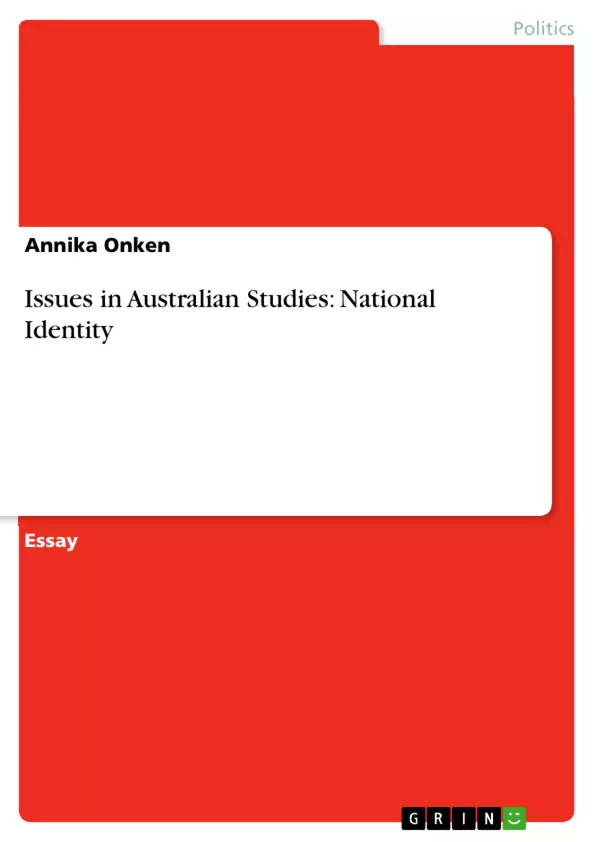Walter (1992) states in his essay ‘Defining Australia’ that the question what the ‘real’ Australia is will never be solved but that there exist and keep arising different ideas about it. These various cultural productions have to be questioned as to who produces them and which purposes they serve. National identity creates unity among people in the sense of Benedict Anderson’s ‘imagined communities’. Members believe in a set of things about what being Australian includes and excludes. National celebrations as for example Australia Day, the proclamation of Commonwealth or Anzac Day are different media guided events on which Australians are held to feel a “collective Australian consciousness” (7). Nevertheless, opposing ideas are put under the same national persuasive ‘cloche’ in order to make differences forgotten. An effective tool to create this nationhood has been myth-making in order to link Australians to a self-picture and “transcend contemporary divisions” (16).
Inhaltsverzeichnis (Table of Contents)
- National Identity
- Defining Australia
- Cultural Transmissions
- Imagining Australia: Ideas for Our Future
- Multiculturalism and National Identity
- The Limits of Multiculturalism
- Indigenous Cultures and National Identity
Zielsetzung und Themenschwerpunkte (Objectives and Key Themes)
This essay explores the complex and multifaceted nature of Australian national identity, examining the historical development of this concept and its relationship to various cultural factors. The essay critically analyzes different perspectives on Australian identity, considering arguments for and against the construction of a singular and unified national identity in a multicultural society.
- The Construction and Evolution of Australian National Identity
- The Role of Cultural Transmissions and Hybridism
- The Impact of Multiculturalism and Indigenous Cultures
- The Power of Cultural Industry and Ideological Framing
- The Challenges of Inclusive and Exclusive National Identity
Zusammenfassung der Kapitel (Chapter Summaries)
The essay examines the concept of Australian national identity through different lenses. Starting with the historical context, it explores how national identity is constructed and shaped by various cultural forces, including the influence of the "cultural industry." The essay further analyzes the implications of multiculturalism on national identity, highlighting the tension between maintaining a sense of national unity and embracing the diversity of cultural backgrounds in contemporary Australia. It also discusses the significance of Indigenous cultures in shaping the national identity and the challenges in achieving a truly inclusive and equitable representation.
Schlüsselwörter (Keywords)
The essay delves into the complexities of Australian national identity, analyzing the impact of cultural transmissions, the role of the "cultural industry," and the challenges of fostering inclusivity in a multicultural society. Key concepts discussed include: national identity, multiculturalism, cultural industry, Indigenous cultures, hybridism, egalitarianism, mateship, fair go, and the Eureka uprising.
Frequently Asked Questions
How is Australian national identity defined?
National identity is seen as an "imagined community" where members believe in a set of shared values, though the definition is constantly evolving and contested.
What are "imagined communities"?
A concept by Benedict Anderson suggesting that nations are socially constructed communities, imagined by the people who perceive themselves as part of that group.
What is the impact of multiculturalism on Australian identity?
Multiculturalism creates a tension between maintaining national unity and embracing the diverse cultural backgrounds of contemporary Australians.
What role do Indigenous cultures play in national identity?
Indigenous cultures are significant to the national self-image, yet achieving inclusive and equitable representation remains a major challenge.
What is "myth-making" in the context of nationhood?
Myth-making involves creating collective stories (like mateship or the "fair go") to link citizens to a shared self-picture and transcend contemporary divisions.
- Quote paper
- Annika Onken (Author), 2009, Issues in Australian Studies: National Identity, Munich, GRIN Verlag, https://www.hausarbeiten.de/document/137783


